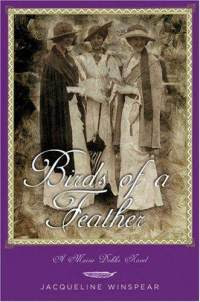 This is book 2 in the Maisie Dobbs series, and Maisie's dealing with a whole different murder mystery in this one. She gets hired to find a missing person, and ends up unraveling a related triple murder case that was mystifying the police--oh my! At the same time, she's trying to solve the simple mystery of her assistant's activities, and it turns out that he's sneaking drugs to help with the pain of his war wounds.
This is book 2 in the Maisie Dobbs series, and Maisie's dealing with a whole different murder mystery in this one. She gets hired to find a missing person, and ends up unraveling a related triple murder case that was mystifying the police--oh my! At the same time, she's trying to solve the simple mystery of her assistant's activities, and it turns out that he's sneaking drugs to help with the pain of his war wounds.
I do really like these books--they're SO quick and easy to get through, and really entertaining. I read this one in spurts while exercising (it's so easy to read on the exercise bike). I think it's kind of interesting/odd how Winspear intertwines Maisie's personal drama with the action in the story--there are men falling for her throughout the book and she's not interested, her and her father have been somewhat disconnected of late, and she realizes that she's really lonely in the place where she is in her life. This seems really odd to me, maybe because I'm just used to Sherlock Holmes as the detective, whose personal life is completely hidden and unattached from his work. But I do like it too, because it makes Maisie seem like a real person and not a machine, like Sherlock always seems. Winspear also tries to give hints and reasons for Maisie's deductions, like how she picks up on people's moods and such when they're interviewing, whereas Doyle NEVER gives you hints that might help you figure things out.
Oh yeah, and I thought Winspear deliberately chose the absolute most random person to be the villain in this case. Obviously mystery authors can't give you many hints so that you don't figure it out before them, but I mean, really? Somebody who you've heard NOTHING about the whole book is the villain? Way to go.




